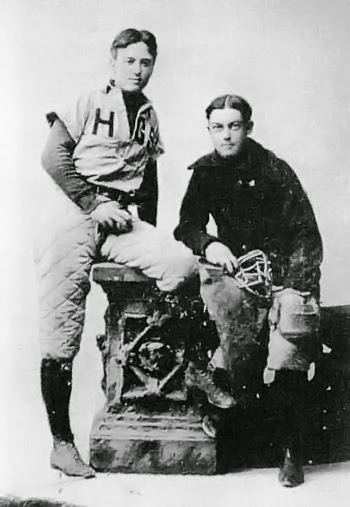Playing Piano by Foot: Charles Ives & Physical Reorientation
 |
| Charles Ives (left), pitcher, ca. 1894 |
Charles Ives and I were teen-agers of about the same age. One day I went up on the hill to the Ives house to visit Charlie, and I found him playing a piano. I was astonished to find that he played it with his feet as well as with his hands. All expert piano players use their feet to affect the piano, but I just learned it that day!At first, I thought that Ryder meant simply that Ives was a smooth operator of the pedals, but I have a sense that this isn't what he meant: Ives literally played the piano using his feet.
This particular anecdote stuck with me as an especially memorable instance of experimentalism for its own sake—that is, for the joy of discovery and exploration into the personally unknown. Non-goal-oriented play like this comes up elsewhere in Ives's biographical history; in Ives's Memos, edited by John Kirkpatrick, Ives doesn't admit to playing the piano with his feet, but does mention another childhood memory of experimenting with his physical approach at the piano:
When I was a boy, I played in my father's brass band, usually one of the drums. Except when counting rests, the practising was done on a rubber-top cheese box or on the piano. The snare and bass drum parts were written on the same staff, and there were plenty of dittos. In practising the drum parts on the piano (not on the drum—neighbours' requests), I remember getting tired of using the tonic and dominant and subdominant triads, and Doh and Soh etc. in the bass. So [I] got to trying out sets of notes to go with or take-off the drums—for the snare drum, right-hand notes usually closer together—and for the bass drum, wider chords. They had little to do with the harmony of the piece, and were used only as sound-combinations as such. For the explosive notes or heavy accents in either drum, the fist or flat of the hand was sometimes used, usually longer groups in the right hand than left hand..
...I mention the above, not that in itself it is much, but to show how the human ear (not one but all) will learn to digest and handle sounds, the more they are heard and then understood. In this example, what started as boy's play and in fun, gradually worked into something that had a serious side to it that opened up possibilities—and in some ways sometimes valuable, as the ears got used to and acquainted with these various and many dissonant sound combinations. I remember distinctly, after this habit became a matter of years, that going back to the usual consonant triads, chords, etc., something strong seemed more or less missing (at least quite often, if not always)—(a feeling one has now, only worse, after the usual hotel-, boat-, and summer-garden, and most nice concerts). (42-3)"...what started off as boy's play in fun, gradually worked into something that had a serious side to it that opened up possibilities." As the specter of true adulthood (i.e., the need for financial independence) looms like desert heat behind a glass window, I've been thinking more and more about what this upcoming final semester of school should be. Originally, I was thinking to keep working on getting down the basic proficiencies of a "professional modern mainstream jazz musician," but I've also been reminded to take advantage of the opportunity for aimless (although not necessarily unproductive) play.
Early tonight, I had the pleasure of improvising freely in a quartet along with some dancers from Boston Conservatory. One dancer mentioned the concept of finding "authentic movement" through their improvisation classes at the conservatory: motions that depart from the standardly taught motions and more closely fit one's physiology and expressive identity. As we embarked on a half-hour improvisation session, I began experimenting with my physical orientation to the instrument and made some discoveries along the way: for instance, I can actually hear what I sound like to others by just turning the neck around and playing with the bell facing myself (maybe the sonic equivalent of seeing oneself in the mirror for the first time). I also found that just by holding the instrument at a different angle (horizontal to the ground, Lester-like, for instance) changes what I tend to play.
I mentioned some of these discoveries to a pianist friend shortly afterward, and he mentioned a similar exercise a teacher had given him wherein he'd sit very low to the ground and somewhat away from the keyboard, then play the piano with his front torso and arms outstretched; he mentioned that playing the piano that way immediately broke some habitual playing tendencies. Has anybody else found radically re-orienting one's physical relationship to the instrument productive or generative of new ideas?
Comments
Post a Comment